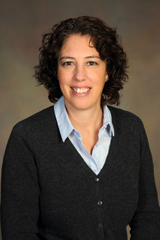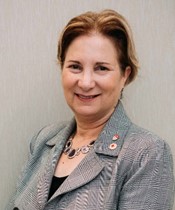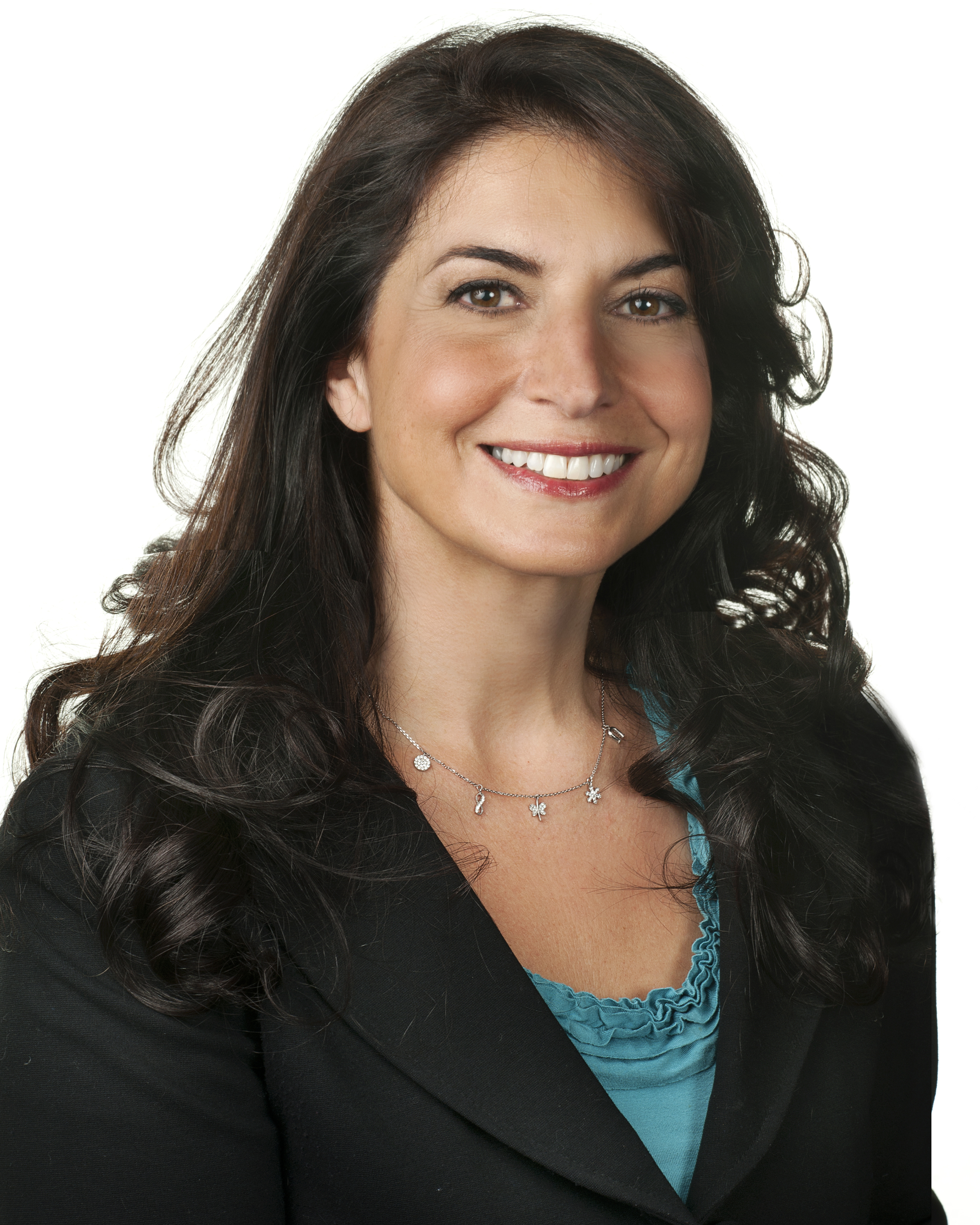On this page:
Elena Bennett
Julie Côté | Mindy Levin | Hanadi Sleiman
Winner
Elena Bennett, Natural Resource Sciences
“My real job is to guide students, not just in the subject matter at hand, but also in how to be great and passionate scientists, first-class colleagues, and societal leaders.”
Biography
I joined McGill in 2005, and have had the great pleasure to work with 30 graduate students and 18 postdocs in the 17 years since then. I’ve gotten to know other graduate students from across several different faculties teaching a course on leadership called “Mobilizing Science for Sustainability”. A highlight for me is hearing from those students who have graduated and moved on to a variety of new and exciting positions that they are putting what they learned in our lab to use in their work.
Approach to graduate supervision
Training graduate students is undoubtedly one of the most important things professors do, and has always been both a centerpiece and a highlight of my career. I believe that this training must go far beyond helping students amass disciplinary expertise and get a degree. My real job is to guide students, not just in the subject matter at hand, but also in how to be great and passionate scientists, first-class colleagues, and societal leaders on the path to a better future. Universities are increasingly recognizing that, even when they provide superior disciplinary training, students do not automatically acquire complementary skills in communication and leadership that are essential for guiding communities and highly desired by employers in all sectors. In my field in particular (sustainability science), these skills are essential to catalyze action, bridge disparate communities, build trust, and ultimately, to lead a transition to a better future for the planet.
Testimonials
When I first started my graduate studies back in 2006, I recall Elena saying something along the lines of “… graduate students may someday become colleagues…”, and how this evolution was important for a good supervisor to keep in mind. This is something I have subsequently reflected on a great deal since becoming a supervisor myself, specifically in the way that a mutually respectful relationship can help students grow and realize their professional goals. Over the years, I have been reminded of her generosity in sharing not just time but the wisdom of her experience with former students. It has also become obvious how she was looking out for potential pitfalls that could have slowed progress or created conflict, and helped trainees find the path that is right for them and realize our diverse goals. I now write from the vantage point of a tenured faculty member here at McGill. So much of my own trajectory has been a direct result of Elena’s thoughtful mentorship, pedagogical prowess, and commitment to my development as a scientist over the past 15 years. In this sense, I really feel fortunate to have had not only a fantastic graduate advisor but also a career mentor.
Graham K. MacDonald, Associate Professor,
Department of Geography, McGill University
Prof. Bennett is a true inspiration: despite her status of being a world-renowned sustainability scientist, she continues to work hard— regularly publishing studies in high-impact journals, presenting in high-level scientific and societal conferences, and collaborating with the world’s biggest research organizations. This inspires me as an early-career researcher who aims to be as productive in our discipline. More importantly, this inspires me as a member of the marginalized in academia (i.e., person-of-color) as she, as a woman, keeps breaking the ceiling in a (once) male-dominated discipline. As my mother, a late school principal, always said, an educator’s job does not rest on how much knowledge they have transferred but how much they have guided their students to be more than what they thought they could be. With Prof. Bennett’s supervision quality, mentorship approach, collaborations and opportunities that she opened for us, and her trust and kindness, I am already hundreds of miles away from what I thought I could be.
Elson Ian Nyl Ebreo Galang, PhD Student, Bennell Lab,
Department of Natural Resource Sciences, McGill University
Nominees
 Julie Côté, Kinesiology and Physical Education
Julie Côté, Kinesiology and Physical Education
“I consider it a privilege to share the career path of graduate students, and the moment when they convocate is undoubtedly one of my proudest moment each year.”
Biography
I am a Full Professor in the Department of Kinesiology and Physical Education, with experience as Associate Dean / Research and Graduate Studies of my Faculty, and Chair of my Department. My research program focuses on the biomechanics and ergonomics of musculoskeletal disorders, with special attention to the neuromuscular mechanisms underlying fatigue and sex differences. My research laboratory, the Biomechanics of Occupations and Sports (BOS) lab, is funded by the CFI, my projects are funded mainly by the NSERC, and my students are well funded to lead projects that can be fundamental or applied, in sports or workplace health contexts.
Approach to graduate supervision
My goal is mainly to inspire and challenge graduate students who are usually already committed to advanced studies in an area very relevant to my area of research expertise. I also challenge them to be well-versed in the current knowledge in our field, but also critical of it. Finally, I make a point to refer to research findings to which I know that other graduate students contributed, and to clearly point out to current limitations and to the needed research advances, to further inspire and invite graduate students to seek to contribute to the advancement of knowledge in our field of kinesiology. I consider it a privilege to share the career path of graduate students, and the moment when they convocate is undoubtedly one of my proudest moment each year. Our joint path always begins with a conversation about our mutual objectives, centered around the articulation of the core values of my research group (respect of each other, ethical values, transparency, cooperation). Care is taken to nurture the relationship with each student, as a unique entity, so as to adapt to each student’s background, personality and career goals, and provide each student with an optimally positive and rewarding experience.
Testimonials
Julie always encouraged me to try different opportunities. I was always lacking self-confidence, doubting if I was good enough, but Julie taught me to not be afraid of failure and there is nothing I would lose. She would help me with the application, provide me her thoughts and feedback. Within the five years of my PhD study, with her encouragement and support, I was awarded multiple national, provincial, local, and school-level scholarships and funding. Until today, I am, and will always be, grateful to have Julie as my PhD supervisor. She gave an opportunity to a kid who was on the other side of the planet, and believed in me, helped me, and mentored me so much. She is the perfect research supervisor every student would want. What she has taught has impacted both my academic career and my life.
Chen Yang, Postdoctoral Fellow, Shirly Ryan AbilityLab,
Rehabilitaiton Institute of Chicago
 Mindy Levin, School of Physical and Occupational Therapy
Mindy Levin, School of Physical and Occupational Therapy
“The moment when my trainee steps up to the podium to receive their degree is undoubtedly one of my proudest each year.”
Biography
Mindy Levin, physiotherapist (McGill 1976), obtained a M.Sc. in Clinical Sciences (UMontréal 1985) and a Ph.D. in Physiology (McGill 1990). From 1992 to 2004, she was a researcher and professor at the School of Rehabilitation at UMontréal and since 2004, she is in the School of Physical and Occupational Therapy at McGill. She was Research Director of the Rehabilitation Institute of Montreal (1997-2001) and Physical Therapy Program Director at McGill (2004-2008). She was Chercheur-Boursier (FRQS) from 1992-2004 and held a Tier 1 Canada Research Chair from 2005-2019. She is currently a Distinguished James McGill Professor. She has over 175 peer-reviewed publications. Her research focuses on elucidating mechanisms underlying sensorimotor deficits and their recovery in patients with CNS lesions.
Approach to graduate supervision
My goal is to inspire and challenge graduate trainees who are usually already committed to advanced studies in an area very relevant to my own area of research expertise. I guide trainees in obtaining in-depth knowledge in related fields of neuroscience and rehabilitation, in using critical judgement to identify current advances as well as limitations and in finding creative and unique ways to contribute to the advancement of knowledge in these fields. Our joint path always begins with a conversation about our mutual objectives, centred on the articulation of the core values of my research group (respect for each other, ethical values, transparency, cooperation, dedication and commitment). I take special care to find effective ways to nurture the relationship with each trainee, recognizing them as a unique individual, and to provide each trainee with an optimally positive and rewarding learning experience. This requires insight and the ability to adapt to each trainee’s background, personality and career goals. I consider it a privilege to provide guidance to and to facilitate graduate trainees along a successful career path. The moment when my trainee steps up to the podium to receive their degree is undoubtedly one of my proudest each year.
Testimonials
The seed of scientific enquiry sown in my mind has been tendered carefully as an expert gardener by Dr. Levin. She stimulates creative freedom in all her students and knows where the line of control has to be drawn judiciously. She constantly supports new research ideas, especially ones that will lead to clinically viable research. She continues to mentor students even after they have completed their degree and become clinicians and new faculty members worldwide. I can personally attest to this fact, as I still seek her counsel and advice. She is a kind and supportive listener and endeavors to deal fairly and equitably with colleagues and students. She has been a guiding light in both my professional and personal lives. It is said that ‘Good teachers teach well; the better ones explain and the best lead by example.’ Dr. Mindy Levin certainly belongs to the third category.
Sandeep Subramanian, Assistant Professor,
Department of Physical Therapy, School of Health Professions, UT Health San Antonio
Dr. Levin has been my supervisor since the fall of 2017, when I started my postdoc fellowship. Dr. Levin aims to guide and mentor students throughout their learning path, helping them discover their own academic and scientific strengths and passion for research. I appreciate her fairness and her ability to provide timely, accurate, and constructive feedback, as well as her precious advice about my career. Like Michelangelo, the Italian Renaissance sculptor, said, “The sculpture is already complete within the marble block, before I start my work. It is already there, I just have to chisel away the superfluous material.” I think that Dr. Levin has the unique ability to see the full potential of her students. With her positive leadership style and her sensitivity to individual needs, Dr. Levin is helping me to discover my potential and preparing me for the next steps of my career.
Daniele Piscitelli, PT, PhD, Assistant Professor,
Department of Kinesiology, University of Connecticut
 Hanadi Sleiman, Chemistry
Hanadi Sleiman, Chemistry
“Answering students’ questions by another question is an efficient way of stimulating their minds and making them to progress further.”
Biography
Hanadi Sleiman is a Professor of Chemistry and Canada Research Chair in DNA Nanoscience at McGill University. She received her Ph.D. from Stanford University, and was a CNRS postdoctoral fellow in Prof. Jean-Marie Lehn’s laboratory at the Université Louis Pasteur. She joined the faculty at McGill University in 1999, where her research group focuses on using the molecule DNA as a template to assemble nanostructured materials. Sleiman is Fellow of the Royal Society of Canada (2016), Associate Editor of J. Am. Chem. Soc., and Editorial Advisory Board member of J. Am. Chem. Soc., Chem., J. Org. Chem., and ChemBioChem. Among her recognitions are the Killam Research Fellowship (2018), Canadian Society of Chemistry R. U. Lemieux Award (2018), Netherlands Scholar Award in Supramolecular Chemistry (2018), Izatt-Christensen Award in Supramolecular Chemistry (2016), Swiss Chemical Society Lectureship (2012), Canadian Institute of Chemistry E. Gordon Young Award (2011), Canadian Society for Chemistry Strem Award (2009), NSERC Discovery Accelerator (2008), McGill Dawson Award (2004-13), Fellow of the Canadian Institute for Advanced Research (2004-12) and Cottrell Scholar (Research Corp., 2002). She received the McGill Principal’s Prize (2002) and the Leo Yaffe Award (2005) for Excellence in Teaching.
Approach to graduate supervision
My goal with the graduate students in my laboratory is to stimulate their creativity, imagination, and thinking and critical evaluation of the information provided by our own research data, as well as from other groups. Here again, the format of answering students’ questions by another question was for me an efficient way of stimulating their minds and making them to progress further. In many instances, this created interesting discussion among us. In fact, my students now all know that my favorite way to close our laboratory meetings is to ask, “What should be done next?” or “What is the next question to answer?”. At the beginning of their training, they were generally not able or sometime too shy to spontaneously answer this kind of questions, but with time, they showed this ability to develop their own future research ideas.
Testimonials
Hanadi has an individualized training program, and provides tailored opportunities based on each student’s interests and skills. For example, as a graduate student I had the opportunity to learn and develop my skills on atomic force microscopy (AFM). Hanadi took note of my interest in the technique, and she provided me with the opportunity to get advanced technical training, teach the technique to other members of the group, and to present at the annual AFM Summer School. These opportunities were crucial in developing my technical and teaching skills. My advanced AFM training was essential in securing a postdoctoral position, and continues to be a crucial part of the research I currently conduct in my lab. Hanadi instilled in me a deep appreciation for research and scientific curiosity.
Karina Carneiro, Assistant Professor,
Faculty of Dentistry and Insitute of Biomaterials and Biomedical Engineering, University of Toronto
 This work is licensed under a
This work is licensed under a 